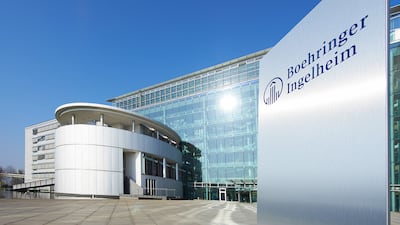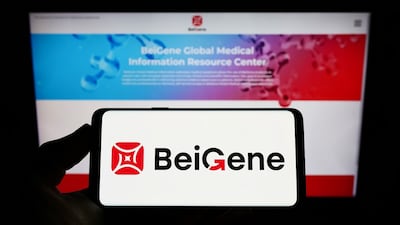Amgen, Inc.’s Phase II maridebart cafraglutide (MariTide, AMG 133) has become a top priority for the company as it prepares to unveil topline Phase II data for the obesity and type 2 diabetes drug and prepares for its Phase III program, including a boost in manufacturing capacity and related capital expenditures.
The Thousand Oaks, CA-based biotech announced its second quarter earnings on 6 August, reporting $8.4bn in revenue, up 20% from the comparable period in 2023, including double-digit sales growth from a dozen of its products. (See table below for detailed product sales.)
Key Takeaways
-
Amgen posted second quarter sales that increased 20% over the comparable period of 2023.
-
While not providing a timeline for Phase III, the company is busy building out its capacity for MariTide and increased its capital expenditures for it.
-
Additional programs saw progress as well, including two approvals for branded oncology drugs and a flurry of clinical development activity.
“We have strength, but most importantly breadth and depth, both in-market and in the pipeline in all four of the therapeutic areas,” chief financial officer Peter Griffith told Scrip, referring to the company’s core therapeutic areas of general medicine, oncology, inflammation and rare diseases. “And so, in addition to obesity, the company is doing really, really well in a very broad way, so it’s all good news.”
On a same-day earnings call, CEO Robert Bradway highlighted the progress the company has made with its pipeline. “We told you at the beginning of the year that we were anticipating more than a dozen significant pipeline milestones in 2024,” he said. “Well, so far, so good.”
Wave Of Development For MariTide
As it stands, Novo Nordisk A/S and Eli Lilly and Company dominate the market for obesity drugs, with the GLP-1 receptor agonist Wegovy (semaglutide) and the GLP-1/GIP agonist Zepbound (tirzepatide), respectively. Novo Nordisk will announce its second quarter results on 7 August and Lilly will announce its results on 8 August, but the companies have already racked up strong sales for their drugs, with Wegovy’s first quarter 2024 sales reaching DKK9.4bn ($1.37bn) and Zepbound’s reaching $517m during the same period. (Also see "Obesity Rules Large-Cap Stocks In First Half Of 2024" - Scrip, 16 July, 2024.) Those do not include off-label use of their respective type 2 diabetes brands, Ozempic and Mounjaro.
Assuming MiraTide can successfully complete Phase III trials and win regulatory approval, it has a lot of ground to cover. However, Amgen is hoping that it can make up for its late-to-market disadvantage with a dosing advantage, namely the ability of patients to take MiraTide via autoinjector monthly or even less frequently, compared with the weekly dosing of Wegovy and Zepbound.
Although MiraTide could potentially face further competition from oral obesity drugs, executive vice president for global commercial operations Murdo Gordon told the call that it is actually weekly injectables that are likely more vulnerable to competition from oral drugs than MiraTide, as Amgen drug’s offers more convenient monthly or less frequent injections.
Multiple drug makers have recently jumped on the bandwagon to develop oral obesity drugs. Roche said in its second quarter earnings call that it would seek to speed its oral GLP-1 agonist to market. (Also see "Slimmer, Faster: Roche Aims To Speed Its Obesity Pill To Market" - Scrip, 25 July, 2024.) Pfizer Inc. likewise said it would advance a once-daily formulation of the oral GLP-1 agonist danuglipron in development after scrapping a twice-daily version, while Lilly, Structure Therapeutics, Inc. and Viking Therapeutics, Inc. have also stepped into the ring. (Also see "Viking Plans To Go Directly To Phase III With Obesity Drug" - Scrip, 25 July, 2024.)
Oral formulations or less frequent dosing would also potentially help address the capacity constraints associated with the weekly injectable drugs, executives said. Thanks to burgeoning demand, the obesity drugs have faced significant shortages. Novo Nordisk’s most recent move was to acquire the contract development and manufacturing organization (CDMO) Catalent, Inc. in March for $16.5bn while spending $4.1bn to expand its own manufacturing capacity, while the Swiss CDMO CordenPharma said last month that it would spend nearly $1bn to increase its own capacity in order to meet demand. (Also see "CordenPharma Will Scale Up To Address GLP-1 Shortage" - Scrip, 16 July, 2024.)
Amgen is likewise making big investments in its capacity for MariTide. The company said in in its first quarter earnings call that it had initiated activities to further expand manufacturing capacity with both clinical and commercial supply in mind, with Bradway saying that the company was not intimidated about the challenge of manufacturing. (Also see "Amgen Planning Pivotal Obesity Program For MariTide" - Scrip, 2 May, 2024.)
Griffith told Scrip 6 August that the company’s new finished drug product plant in Ohio was licensed in the first quarter, and it expects to have a drug substance plant in North Carolina licensed and in operation in 2026. Increased manufacturing capacity for MariTide to meet the needs of the Phase III study program is the main reason why Amgen increased capex from a range of $1.1-$1.2bn to $1.3bn, he added.
However, while the company remained bullish on plans to unveil 52-week topline Phase II data later in the year, it did not provide a timeline on when it would start Phase III trials. Executives also told the Q2 call that Amgen plans to have another obesity candidate in the clinic later in the year.
More Pipeline Development
Elsewhere in the metabolic space, the PCSK9 inhibitor Repatha (evolocumab) is in a Phase IV study to test its ability to reduce cardiovascular events after heart attack as well as the Phase III VESALIUS-CV cardiovascular outcomes study, while the small interfering RNA drug AMG 890 (olpasiran) is in the Phase III Ocean-Outcomes cardiovascular outcomes trial.
Amgen is likewise pushing ahead with pipeline assets in its other disease areas, such as oncology, where the STEAP1-targeting bispecific antibody AMG 509 (xaluritamig) is in Phase I development, including in combination with Pfizer and Astellas Pharma, Inc.’s Xtandi (enzalutamide) and Johnson & Johnson’s Zytiga (abiraterone).
Additional pipeline highlights included the US Food and Drug Administration accelerated approval in May of Imdelltra (tarlatamab-dlle) in extensive-stage small-cell lung cancer (ES-SCLC). The drug, the first DLL3-targeting bispecific, is also in development for additional SCLC settings and prostate as well as other cancers. (Also see "Amgen’s Imdelltra Wins FDA Nod In Underserved SCLC Population" - Scrip, 17 May, 2024.)
In June, Amgen’s Blincyto (blinatumomab) added another indication to its label, for adult and pediatric patients with CD19-positive, Philadelphia chromosome-negative acute lymphoblastic leukemia in the consolidation phase, regardless of measurable residual disease status.
Meanwhile, in May, the FDA approved Bkemv (eculizumab) as the first interchangeable biosimilar of AstraZeneca PLC’s Soliris.
Sales Growth
Overall, product sales grew by 20%, thanks to 26% volume growth, with 3% lower net selling price partially offsetting that growth. Excluding sales from the acquisition of Horizon Therapeutics, product sales grew by 5%.
Products acquired through last year’s $27.8bn acquisition of Horizon last year include Tepezza (teprotumumab) for thyroid eye disease (TED), Krystexxa (pegloticase) for gout and Uplizna (inebilizumab) for neuromyelitis optica spectrum disorder (NMOSD). Rare disease drugs, which include the severe active anti-neutrophil cytoplasmic autoantibody-associated vasculitis drug Tavneos (avacopan), contributed $1.1bn to sales.
Drugs that saw double-digit growth included Repatha, with a 25% increase in sales to $532m; the osteoporosis drug Evenity (romosozumab-aqqg), which grew 39% to $391m; the osteoporosis drug Prolia (denosumab), up 13% to $1.17bn; and Blincyto, up 28% to $264m.








